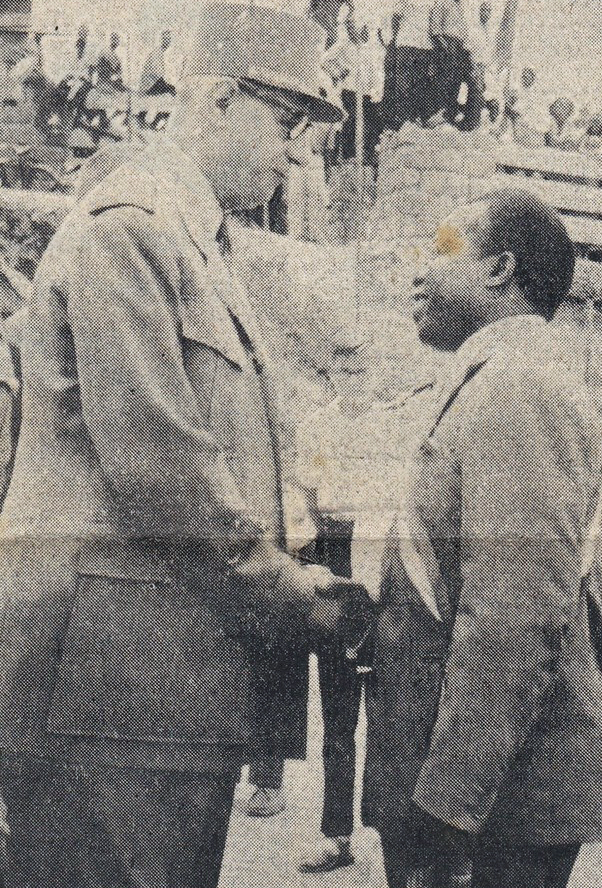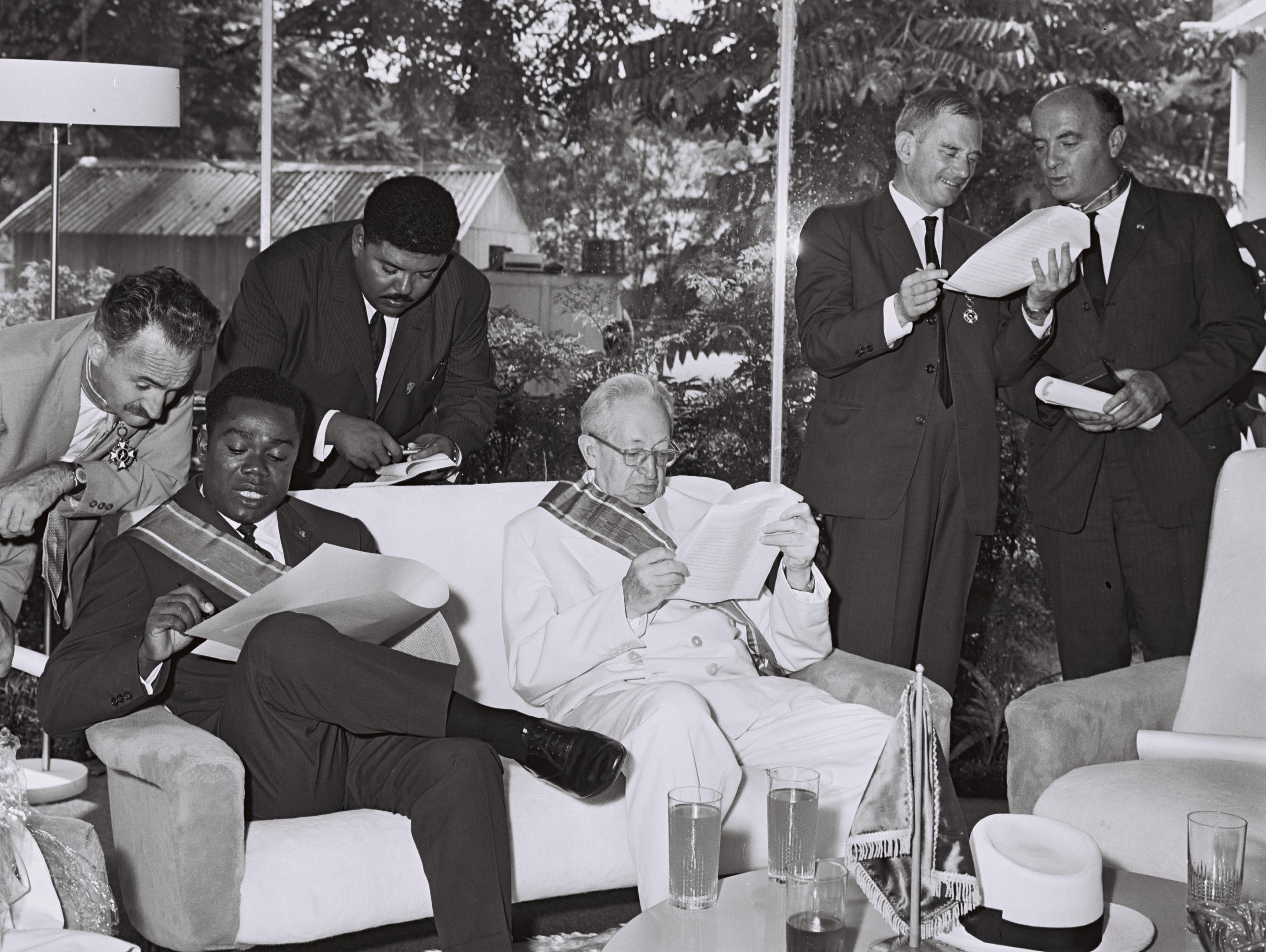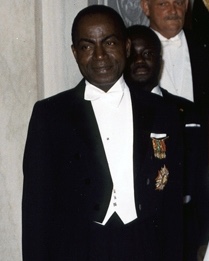|
MESAN
The Movement for the Social Evolution of Black Africa (; MESAN) was a political party in the Central African Republic. In its original form, it was a nationalist party that sought to affirm Black people, black humanity and advocated for the independence of Ubangi-Shari, then a French colonial territory. History The party, which was initially intended to work as a political movement, was founded by Barthélemy Boganda in Bangui, Ubangi-Shari (later known as the Central African Republic) on 28 September 1949, to connect "all the Blacks of the world" and "to promote the political, economic and social evolution of black Africa, to break down the barriers of tribalism and racism, to replace the degrading notion of colonial subordination with the more human ones of fraternity and cooperation." The statutes of the movement were written in April 1950, and the group's branches were set up in Ubangui, N'Djamena, Fort Lamy and Brazzaville. The formation of MESAN did not sit well with the ... [...More Info...] [...Related Items...] OR: [Wikipedia] [Google] [Baidu] |
Barthélemy Boganda
Barthélemy Boganda ( – 29 March 1959) was a Central African politician and independence activist. Boganda was active prior to his country's independence, during the period when the area, part of French Equatorial Africa, was administered by France under the name of Oubangui-Chari. He served as the first List of heads of government of the Central African Republic and Central African Empire, Premier of the Central African Republic as an territorial autonomy, autonomous territory. Boganda was born into a family of farmers, and was adopted and educated by Roman Catholic missionaries after the death of his parents. In 1938, he was ordained as a Roman Catholic priest. During World War II, Boganda served in a number of missions and afterwards was persuaded by the Bishop of Bangui to enter politics. In 1946, he became the first Oubanguian elected to the National Assembly of France, where he spoke out against racism and the abuses of the colonial regime. He then returned to Oubangui-C ... [...More Info...] [...Related Items...] OR: [Wikipedia] [Google] [Baidu] |
Central African Republic
The Central African Republic (CAR) is a landlocked country in Central Africa. It is bordered by Chad to Central African Republic–Chad border, the north, Sudan to Central African Republic–Sudan border, the northeast, South Sudan to Central African Republic–South Sudan border, the east, the Democratic Republic of the Congo to Central African Republic–Democratic Republic of the Congo border, the south, the Republic of the Congo to Central African Republic–Republic of the Congo border, the southwest, and Cameroon to Cameroon–Central African Republic border, the west. Bangui is the country's capital and largest city, bordering the Democratic Republic of the Congo. The Central African Republic covers a land area of about . As of 2024, it has a population of 5,357,744, consisting of about 80 ethnic groups, and is in the scene of a Central African Republic Civil War, civil war, which has been ongoing since 2012. Having been a Ubangi-Shari, French colony under the name Ubangi ... [...More Info...] [...Related Items...] OR: [Wikipedia] [Google] [Baidu] |
1959 Central African Republic Parliamentary Election
Parliamentary elections were held in the Central African Republic on 5 and 29 April 1959. The result was a victory for the Movement for the Social Evolution of Black Africa (MESAN), which won all 48 contested seats on election day. Two seats were left vacant, and the vote for one seat won by MESAN was declared void. In a re-run, all three seats were won by MESAN, giving it all 50 seats in the National Assembly. EISA Voter turnout was 56.71%. Results References {{Central African Republic electionsCentral Africa
Central Africa (French language, French: ''Afrique ...
[...More Info...] [...Related Items...] OR: [Wikipedia] [Google] [Baidu] |
Central African Democratic Union
The Central African Democratic Union (, UDC) was a political party in the Central African Republic. History The UDC was established by David Dacko in March 1980 at a congress. Dacko claimed that the UDC was the continuation of Movement for the Social Evolution of Black Africa (MESAN). The party was banned on 2 September 1981, following the 1981 Central African Republic coup d'état. EISA Electoral history Presidential elections References 1980 establishments in the Central African Republic 1981 disestablishments in the Central African Republic African and Black nationalist parties in Africa Defunct political parties in the Central African Republic Parties of one-party systems Political parties disestablish ...[...More Info...] [...Related Items...] OR: [Wikipedia] [Google] [Baidu] |
Abel Goumba
Abel Nguéndé Goumba (; 18 September 1926 – 11 May 2009) was a Central African politician. During the late 1950s, he headed the government in the period prior to independence from France, and following independence he was an unsuccessful candidate for President of the Central African Republic four times (1981, 1993, 1999, and 2005). Goumba, who was President of the Patriotic Front for Progress (FPP) political party, served under President François Bozizé as Prime Minister from March 2003 to December 2003 and then as Vice President of the Central African Republic from December 2003 to March 2005. Subsequently, he was appointed to the official post of Ombudsman. Early life He was born in 1926 in Grimari, Ouaka Prefecture in the Oubangi-Chari French colony, which is now the Central African Republic. He was a qualified medical doctor and member of the medical faculty in Bangui. Entry into politics and exile (1957-1981) While the country was still a French colony, Goumb ... [...More Info...] [...Related Items...] OR: [Wikipedia] [Google] [Baidu] |
David Dacko
David Dacko (; 24 March 1930 – 20 November 2003) was a Central African politician who served as the first President of the Central African Republic from 14 August 1960 to 1 January 1966 and as the third President of the Central African Republic from 21 September 1979 to 1 September 1981. He also served as Prime Minister of the Central African Republic from 1 May 1959 to 14 August 1960. After his second removal from power in a ''coup d'état'' led by General André Kolingba, he pursued an active career as an opposition politician and presidential candidate with many loyal supporters; Dacko was an important political figure in the country for over 50 years. Early life and education Dacko was born in the village of Bouchia, near Mbaïki in the Lobaye region (which was then a part of the French Equatorial African territory of Ubangi-Shari), to Joseph Iniabodé and Marie Okolania. His parents belonged to the same ethnic group. A M'Baka (Ngbaka), he was a distant cousin of fut ... [...More Info...] [...Related Items...] OR: [Wikipedia] [Google] [Baidu] |
Independence
Independence is a condition of a nation, country, or state, in which residents and population, or some portion thereof, exercise self-government, and usually sovereignty, over its territory. The opposite of independence is the status of a dependent territory or colony. The commemoration of the independence day of a country or nation celebrates when a country is free from all forms of colonialism; free to build a country or nation without any interference from other nations. Definition Whether the attainment of independence is different from revolution has long been contested, and has often been debated over the question of violence as legitimate means to achieving sovereignty. In general, revolutions aim only to redistribute power with or without an element of emancipation, such as in democratization ''within'' a state, which as such may remain unaltered. For example, the Mexican Revolution (1910) chiefly refers to a multi-factional conflict that eventually led to a ... [...More Info...] [...Related Items...] OR: [Wikipedia] [Google] [Baidu] |
Étienne N'Gounio
Étienne, a French analog of Stephen or Steven, is a masculine given name. An archaic variant of the name, prevalent up to the mid-17th century, is Estienne. Étienne, Etienne, Ettiene or Ettienne may refer to: People Artists and entertainers *Etienne Aigner (1904–2000), Hungarian-born German fashion designer *Étienne Chatiliez (born 1952), French film director *Étienne de Crécy (born 1969), French electronic music producer and DJ *Étienne Daho (born 1956), French singer, songwriter and record producer * Etienne Debel (1931–1993), Belgian actor and director *Étienne Doirat (c. 1675–1732), French furniture designer. *Étienne Maurice Falconet (1716–1791), French Rococo sculptor *Etienne Girardot (1856–1939), Anglo-French actor *Étienne Jodelle, seigneur de Limodin (1532–1573), French dramatist and poet * Étienne Loulié (1654–1702), French musician, pedagogue and musical theorist *Étienne Méhul (1763–1817), French composer *Étienne Moulinié (1599–1676) ... [...More Info...] [...Related Items...] OR: [Wikipedia] [Google] [Baidu] |
Westport, Connecticut
Westport is a town in Fairfield County, Connecticut, United States. Located in the Gold Coast (Connecticut), Gold Coast along the Long Island Sound, it is northeast of New York City and is part of the Western Connecticut Planning Region, Connecticut, Western Connecticut Planning Region. Westport's public school system is ranked as the top public school district in Connecticut and 17th best school district in the United States. History The earliest known inhabitants of the Westport area as identified through archaeological finds date back 7,500 years. Records from the first white settlers report the Pequot Indians living in the area which they called ''Machamux'' translated by the colonialists as ''beautiful land''. Settlement by colonialists dates back to the five ''Bankside Farmers''; whose families grew and prospered into a community that continued expanding. The settlers arrived in 1693, having followed cattle to the isolated area. The community had its own ecclesiastical so ... [...More Info...] [...Related Items...] OR: [Wikipedia] [Google] [Baidu] |
Greenwood Press
Greenwood Publishing Group, Inc. (GPG) was an educational and academic publisher (middle school through university level) which was part of ABC-Clio. Since 2021, ABC-Clio and its suite of imprints, including GPG, are collectively imprints of British publishing house Bloomsbury Publishing. The Greenwood name stopped being used for new books in 2023. Established in 1967 as Greenwood Press, Inc., and based in Westport, Connecticut, GPG published reference works under its Greenwood Press imprint; and scholarly, professional, and general-interest books under its related imprint, Praeger Publishers (). Also part of GPG was Libraries Unlimited, which published professional works for librarians and teachers. Both of the latter became stand-alone imprints of ABC-Clio, in 2008–2009, after its purchase of GPG. History 1967–1999 The company was founded as Greenwood Press, Inc. (GPI) in 1967 by Harold Mason, a librarian and antiquarian bookseller, and Harold Schwartz, who had a backg ... [...More Info...] [...Related Items...] OR: [Wikipedia] [Google] [Baidu] |
1957 Ubangi-Shari Territorial Assembly Election
Territorial Assembly elections were held in Ubangi-Shari on 31 March 1957. The first and second college system for giving separate seats to Europeans and Africans was scrapped, and all 50 seats elected by universal suffrage. Juan Fandos-Rius The result was a victory for the Movement for the Social Evolution of Black Africa
The Movement for the Social Evolution of Black Africa (; MESAN) was a political party in the Central African Republic. In its original form, it was a nationalist party that sought to affirm black humanity and advocated for the independence of ...
[...More Info...] [...Related Items...] OR: [Wikipedia] [Google] [Baidu] |
Rassemblement Démocratique Africain
The ''Rassemblement Démocratique Africain'', commonly known as the RDA and variously translated as African Democratic Assembly and African Democratic Rally, was a political party in French West Africa and French Equatorial Africa which was important in the decolonization of the French empire. The RDA was composed of different political parties throughout the French colonies in Africa and lasted from 1946 until 1958. At certain points, the RDA was the largest political party in the colonies in Africa and played a key role in the French government headed by the Democratic and Socialist Union of the Resistance (UDSR). Although the regional party largely dissolved in 1958 with the independence votes for the colonies, many of the national parties retained the RDA in their name and some continue to do so. The political ideology of the party did not endorse outright secession of colonies from France, but it was anti-colonial and pan-Africanist in its political stances. The RDA was ... [...More Info...] [...Related Items...] OR: [Wikipedia] [Google] [Baidu] |



